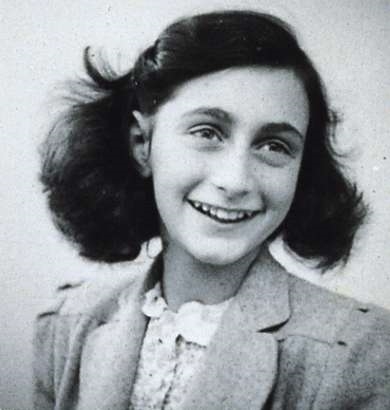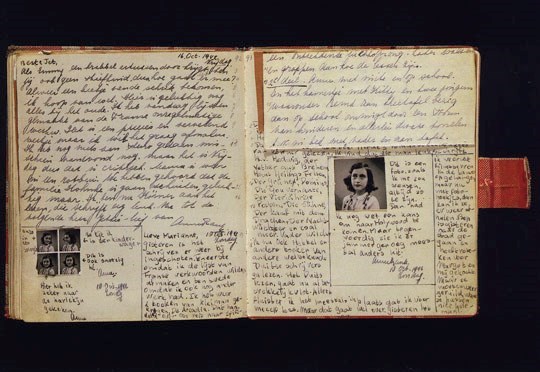 |
| Anne Frank before the Holocaust (https://district.d230.org/sandburg/booster/theater/Theater_pics1/ANNE%20FRANK.jpg) |
Who could have ever imagined that this everyday normal girl would become an international sensation? Having her diary “translated into at least forty languages and adapted into the Pulitzer Prizewinning play The Diary of Anne Frank, which was made into a motion picture”(Frank, Anne(lies) (Marie) (1929-1945)). This teenage girl is considered a hero not because of what she endured, but how she handled herself making the best out of the appalling situation: being a Jew in the Holocaust and living 3 years in a confined space with eight other people. All the while writing a simple diary without thinking about how it would change the world. “It may well be that the single most enduring thing to be born during the entire course of the Nazi nightmare…” (Morton). But some people wouldn’t consider Anne Frank as a hero because they might think she simply wrote a diary. But peering deeper into her life, she should be respected for her passion for writing, her courage, and what human kind has gained from her knowledge.
Anne’s first thirteen years of life were as normal as yours or mine, having many close friends and loving school. But around May 1933, they realized something had changed; the Nazis had gained power. Jews lost privileges such as taking the bus, and were not allowed to be on the streets past eight p.m.. In July of 1942, the Frank family, the Van Daan family, and Mr. Dussel all moved into a secret Annex above Mr. Frank’s warehouse. After about two painful years of hiding in the secret apartment, the hidden families were discovered by a burglar in the night who heard footsteps and reported them. They were all transferred to concentration camps, Mr. Frank being the only one who made it out alive. Anne died of typhus in 1945, just mere weeks before the Nazis lost power. Mr. Frank returned to Amsterdam to find a diary that Anne had kept from June 12th, 1942 until August 1st, 1944 of her life in the Annex. It was very sharp and witty and provided great insight about the Holocaust to historians. In 1947, Mr. Frank published Anne’s diary, which since then, had been translated into a number of languages, plays, and movies.
Anne experienced many hardships, but she believed that when, and if, she got out of World War II alive, she would become a professional writer. She had the passion and the skills to be great. She never let her passion weaken through her hardships, instead she let them ignite, writing all her experiences and feelings in a diary that she called “Kitty”. But throughout all her trouble, she still found strength to write and did her best to embrace her passion even with limited supplies like pencils and other obstacles standing in her way. “Anne the victim. It was almost easy to forget Anne the writer, who made her victimization so memorable…” (Morton). You can’t help but feel bad for Anne in her last few years of life spent in that apartment. But that was not her intention to make people feel bad for her, she simply wrote her diary to express her deep feelings. Not realizing that it would “achieve world fame” (Mendelsohn) or give historians new insight in the Holocaust, although she ended up doing both. She may not have known at the time what her diary would transpire to be, but all in all she chose not to sit around but to document all of her experiences- making her a hero.
Most of us, younger or older than Anne, couldn’t imagine what the young teenager was suffering through. She had an immense amount of courage, a trait important for a hero. Living days where they weren’t allowed to move, to nights where all they could hear and feel were the surrounding bombs. To be right in the middle of a war is traumatizing enough, but imagine being one of the Jews they are searching for and no more than fifteen years old. Living in hiding for your own safety, this was Anne’s life day after day. She courageously faced her fear of war and bombs by sticking through it, not breaking down, and not showing her fear. “Such enormously difficult simplicity is the hallmark of her journal. Not even terror or the most painful constraint could deprive her of a wonderfully feminine, young, vital, responsiveness” (Morton). She didn’t let her terror get in her way of living the fullest life possible while confined in such a tight area. She escaped her horrid world by writing, “Anne was able to convey to the reader the fears about discovery and the hopes about an end to the war” (Mendelsohn). Her fears were real and she expresses true heroism in her bold reaction to all of that change and difficulty.
 |
| Anne's diary (http://jeffwerner.ca/images/journal/anne-frank-diary-open.jpg) |
But going through all of these unthinkable things, Anne remained calm and, instead of whining, gained more maturity by the day. But it wasn’t just her maturity and courage that makes her an inspiration. It’s also how she helped the world by shedding new light on what Jews actually experienced in World War II. Her journal helped historians and everyone truly understand the hardships people suffered through firsthand during the Holocaust. Her diary was one of the only pieces of literature about the Holocaust to be found and published that was written by someone who was actually affected by it. It was a rare find to have someone document all of his or her experiences everyday. So when they found not only a journal full of Holocaust information, but also the heart breaking story of a teenage girl forced into hiding with an unusual talent of writing, the public went wild. Making different versions, languages, plays, and even a movie. “What emerges from Frank’s diary is a multifaceted young person who is at once an immature young girl and a precious, deep-thinking individual.” (Frank, Anne(lies) (Marie) (1929-1945)). If you were to read her diary, it gives magnificent insight to what was happening. She wrote more advanced and well thought out words than I imagine most adults are able to do. She was well beyond her time. No one, not even her own dad, imagined a teenage girl could impact history and peoples’ hearts as much as Anne did. “After reading her diary, Otto Frank confessed, ‘I never knew my little Anna was so deep’”(Frank, Anne(lies) (Marie) (1929-1945)).
We should not feel bad for Anne or her troubled last years of life. We should instead, admire her writing skills, and respect her for her courage not to give up and surrender to the Nazis. Courage and passion are two heroic traits, which Anne demonstrates very nicely. It took a lot of courage not to break down and to continue with her diary in tough times. We should admire her for her astounding writing talent, facing her fear of the war, even though she didn’t have a choice, and how she, and the world, has grown from the diary of a young girl and an everyday hero.
Page created on 5/16/2010 12:00:00 AM
Last edited 5/16/2010 12:00:00 AM
Mendelsohn, John. “Frank, Anne (1929-1945).” Encyclopedia of World Biography. Ed. Suzanne M. Bourgoin. 2nd ed. Detroit: Gale Research, 1998. 17 vols. Student Resource Center – Gold. DEL NORTE HIGH SCHOOL. 30 Apr. 2010
Morton, Frederic. “Her Literary Legacy.” DISCovering Authors. Online ed. Detroit: Gale,2003. Student Resource Center – Gold. Gale. DEL NORTE HIGH SCHOOL. 3 May. 2010
